 I mentioned Speculoos à Tartiner before, when in January this unusual Christmas gift caused both U.S. Customs and the TSA concern on my return from Switzerland. Now that Porter and I have been in the same city long enough to broach the jar, I find it deserves a post of its own.
I mentioned Speculoos à Tartiner before, when in January this unusual Christmas gift caused both U.S. Customs and the TSA concern on my return from Switzerland. Now that Porter and I have been in the same city long enough to broach the jar, I find it deserves a post of its own.
The giving and receiving of this liquid gold at Christmastime should become a tradition on the order of stockings hung by the chimney with care.
Speculoos à Tartiner looks and spreads like peanut butter, and tastes like a Biscoff cookie. Thus far we have only sampled it on bread—plus a small, furtive spoonful this morning in the interest of journalistic accuracy. For the future I'm thinking pancake, waffle, and ice cream topping, fruit dip, frosting for a creamy vanilla cake, and a new twist on cinnamon rolls. What would you suggest?
It was with much trepidation that I looked at the nutritional data on the label, but it's quite comparable to peanut butter, being higher in sugar, but with fewer calories and less fat.
I'm curious to find out if any of my readers can obtain Speculoos à Tartiner at a local store. Wegmans, for example, is my court of last resort when it comes to unusual foods—what a pity the nearest store is 800 miles distant. But there's always the Internet, where you can buy this confection under the name "Biscoff Spread": $12.95 plus $5 shipping (continental U.S.) will get you two jars. One could easily replace the marshmallow chicks in an Easter basket.
Or you could schedule your own trip to Europe. True, that is somewhat pricier, but also infinitely more rewarding. And in all likelihood it will earn you personal attention from Customs and the TSA upon your return.
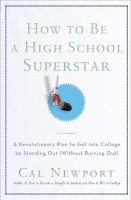
How to Be a High School Superstar: A Revolutionary Plan to Get into College by Standing Out (Without Burning Out), by Cal Newport (Broadway Books, New York, 2010)
If I could recommend two books to help a 12-15 year old student prepare for college, it would be Alex and Brett Harris's Do Hard Things and this one. Some of the political and religious views expressed in the former set my teeth on edge, but it's well worth the effort to get past that reaction, because Brett and Alex write well, and what they are saying is incredibly important, not just for teens who share their beliefs, but for everyone, of any age.
How to Be a High School Superstar is altogether different in focus, but I can boil the best of both books down to this: Life doesn’t begin when you graduate from high school. or college, or grad school. You can do hard things, good things, amazing things, now. Or, rather, in a little while from now, if you are willing to put forth some effort in the right direction. (More)
Ender's Shadow, by Orson Scott Card (Tor, New York, 1999)
Having read Ender's Game and Speaker for the Dead while visiting one son-in-law's library for the birth of a grandchild, it seems only fair to read Ender's Shadow while visiting the other son-in-law's library for the birth of the next grandchild.
Although I liked Ender's Game a lot, I was disappointed by the sequel and thus did not pursue the series any further. But Ender's Shadow is Ender's Game as seen from the point of view of Bean, one of my favorite characters, and was recommended to me, so when I found it on the bookshelves here I couldn't resist.
It's good. Maybe better than the original. Not great, but fun to read and hard to put down for anything less than a grandchild.
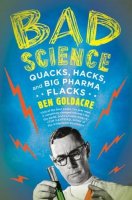
Bad Science: Quacks, Hacks, and Big Pharma Flacks, by Ben Goldacre (Faber and Faber, New York, 2010)
Bad Science was hard to read. Not because the material is difficult (it's not), nor because I disagree with the author's positions (though sometimes I do), but because it is 258 pages of sneer. Since Goldacre repeatedly states that he is bending over backwards to give his adversaries as much credit as possible, perhaps the sneer is unintentional, but it is no less an impediment. (More)
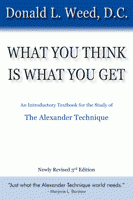
What You Think Is What You Get: An Introductory Textbook for the Study of the Alexander Technique, by Donald L. Weed (Third Edition, ITM Publications, Bristol, UK, 2004)
I wish I understood this book well enough to review it. The Wikipedia article on Alexander Technique is currently flagged, “This article may be confusing or unclear to readers.” Much the same could be said for the book, though I have to say that having read the book makes the article, if not clear, at least familiar.
What You Think Is What You Get is a keeper; it’s just not for beginners, despite the word “introductory” in the title. I would not have read very far if I had not already seen the Alexander Technique in action. However, not only do I know how much it helped Janet with her overuse injuries, but I’ve observed several classes and even had a few short lessons myself. Janet’s Alexander Technique teacher studied under Donald Weed, and her classes are nothing less than remarkable. Who would have thought that a gentle touch and the suggestion that the student relax a certain shoulder muscle would suddenly make his singing voice deeper and richer? Or that an almost imperceptible postural change would make a pianist’s music come alive? Or that being asked, “Do you really need to contract that arm muscle to help you walk across the room?” would visibly improve my walking as well as relieve arm pain I’ve had for years? (More)
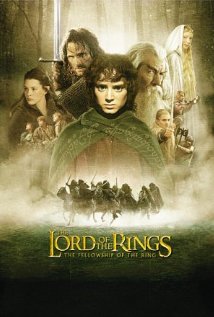 The Lord of the Rings: The Fellowship of the Ring (2001, PG-13)
The Lord of the Rings: The Fellowship of the Ring (2001, PG-13)
Rarely do we spare the time, effort, and expense to watch a movie in the theater, but back in 2001 we ventured into the cold of a Massachusetts winter, in my eagerness to see what the filmmakers had made of one of my all-time favorite books (and Porter's eagerness to see New Zealand, one of his all-time favorite countries, the setting for the film).
I was prepared to be disappointed, as I've yet to find a movie more appealing than the book on which it is based. I was not prepared to be bored. I don't bore easily, but this film succeeded: I couldn't wait for the three hours to be over.
Nine years later I decided it was time to give the film another chance. Whether I like it or not, this version has entered the popular consciousness, and for most people, The Lord of the Rings IS the movie. Having recently re-read the book, I ordered the first of the trilogy from Netflix, determined to watch with a more open mind. (More)
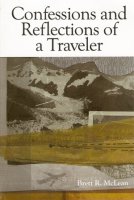 Confessions and Reflections of a Traveler, by Brett R. McLean (Iona Press, Vancouver, 200)
Confessions and Reflections of a Traveler, by Brett R. McLean (Iona Press, Vancouver, 200)
If you can't judge a book by its cover, you can't judge it by random samples, either.
Both of our book-loving girls married book-loving men, so a visit to the grandchildren often leads to picking up random books, which might be found anywhere in the house. This particular book was on the bathroom reading shelf, and I found myself picking it up several times a day. In this manner I read many small samplings of the book, taken randomly from the middle.
McLean and a college companion decided one summer to travel across the United States on half a shoestring. Since this is what Porter did some 20 years earlier, I thought the book might be a good gift for some upcoming occasion. To be certain, I decided to borrow the book and begin at the beginning. (More)
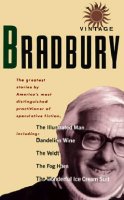 The Vintage Bradbury: Ray Bradbury's Own Selection of His Best Stories, by Ray Bradbury (Vintage, 1990) (original copyright 1965)
The Vintage Bradbury: Ray Bradbury's Own Selection of His Best Stories, by Ray Bradbury (Vintage, 1990) (original copyright 1965)
I picked this book out from my son-in-law's collection because my nephews had recently read Something Wicked This Way Comes for their book club, and I realized I hadn't read any Bradbury in a long time.
Now I'm probably done for another five years or so. Some of the stories were enjoyable, but most I found too weird and depressing for me. Tales of bizarre "healers" whose treatment of choice turns out to be rape, and of children plotting to kill their parents—not to mention babies murdering their mothers!—are not worth spending precious reading time on. I'm very sensitive to the content of what I read and watch—One Flew Over the Cuckoo’s nest troubled me for years—and find it better not to give my mind too many dark ideas upon which to brood.
On the other hand, nobody writes like Ray Bradbury. I wish he had put his imagination and incredible descriptive skills to a more uplifting purpose; he’s a genius, without doubt. His stories are about as close to poetry as prose can get—at least not without falling into the outlandish world of James Joyce.
And family is family. Ray Bradbury is my sixth cousin twice removed. 
Now I'm probably done for another five years or so. Some of the stories were enjoyable, but most I found too weird and depressing for me. Tales of bizarre "healers" whose treatment of choice turns out to be rape, and of children plotting to kill their parents—not to mention babies murdering their mothers!—are not worth spending precious reading time on. I'm very sensitive to the content of what I read, or watch—One Flew Over the Cuckoo’s nest troubled me for years—and find it better not to give my mind too many dark ideas upon which to brood.
On the other hand, nobody writes like Ray Bradbury. I wish he had put his imagination and incredible descriptive skills to a more uplifting purpose; he’s a genius, without doubt. His stories are about as close to poetry as prose can get without falling into the outlandish world of James Joyce.Inconstant Moon, by Larry Niven (Orbit, 1991; original copyright 1973)
One of the advantages of having our son-in-law's book collection at hand is that I can indulge in my passion from a previous stage in life: science fiction. The disadvantage is that I'm beginning to suspect that my tastes have changed.
I thought I remembered liking the works of Larry Niven, and maybe I did. But now, this collection of stories was one-for-seven for me. The last, Death by Ecstasy, is an interesting mystery, but most of the tales are dated, with an embarrassing 1960s flavor—not surprising, since that is when they were written. There's just too much of the holier-than-thou, making a point that the characters are of different races (racial tensions were a big problem in the 60s), and 'way too much emphasis on how in the (enlightened) future, the one-husband, one-wife, faithfully-married-with-children kind of sexual practice, so reviled by the sexual revolutionaries of the time, will be such a rare variation as to be almost unmentionable. This might have been daring, titilating writing 45 years ago, but today it gets old fast.
On the other hand, I enjoy observing the ways in which the old science fiction writers mis-called both scientific and social changes. As they say, anyone can predict the invention of the automobile, but it takes a genius to anticipate the traffic jam. In a world of interstellar travel, enormous lifespans, and pleasure-stimulating brain implants, the computers are still huge, and ashtrays common in every home, hotel, and office.
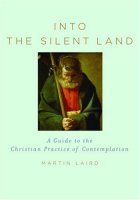 Into the Silent Land: A Guide to the Christian Practice of Contemplation , by Martin Laird (Oxford University Press, 2006)
Into the Silent Land: A Guide to the Christian Practice of Contemplation , by Martin Laird (Oxford University Press, 2006)
The physical benefits of meditative techniques are well established, and I’d like to be able to take advantage of them. What has hindered me is that many—though not all—of the studies have focused on Transcendental Meditation (TM), the Eastern religious aspects of which have led me to keep meditation in general at arm’s length since I first learned of it some 40 years ago. It will not do to gain a physical benefit at a spiritual loss—I can’t help thinking of The Magician’s Nephew, in which Digory was tempted to steal an apple that would have cured his dying mother, but if he had done so, both he and his mother would have later “looked back and said it would have been better to die in that illness.”
Yet Digory, having passed the test, was eventually given another apple, one that healed his mother in the right way. (More)
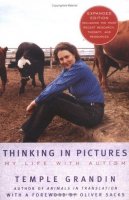 Thinking in Pictures: And Other Reports from My Life with Autism, by Temple Grandin (Vintage, 2006) (Expanded from the original 1995 version)
Thinking in Pictures: And Other Reports from My Life with Autism, by Temple Grandin (Vintage, 2006) (Expanded from the original 1995 version)
I’ve already written about Temple Grandin, the movie, which was the inspiration for getting this book from the library. It’s well worth reading, and the only reason I’m sending back unread the two other books of hers I picked up at the same time is that I realized I must put the brakes on my reading for a while. At the very least I need to substitute books I won’t be tempted to review. 
Thinking in Pictures would have convinced me, if Grandin’s own commentary on the DVD had not, that the movie is an accurate, if not perfect, portrayal of her life. It’s fascinating to read about autism from the inside out, as it were, and also interesting to note her opinion that for all the advances we have made in understanding autism and Asperger’s syndrome, as a child in the 1950’s she had a few advantages over today’s children. School classrooms were well-ordered and quiet; the noise and chaos often seen classrooms now would have been impossible for her to handle. Parents, teachers, and other adults worked hard to instill good manners and polite behavior into children; these are difficult but essential skills for autistic children to learn, but they are sadly neglected today. Finally, there were no video games then, which encourage solitary activity; she was forced to interact directly with other children through board games, outdoor play, and other normal, 1950’s-era activities. (More)
Permalink | Read 3336 times | Comments (0)
Category Reviews: [first] [previous] [next] [newest] Health: [first] [previous] [next] [newest] Food: [first] [previous] [next] [newest] Conservationist Living: [first] [previous] [next] [newest]
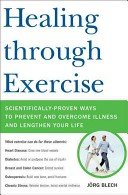 Healing through Exercise: Scientifically-Proven Ways to Prevent and Overcome Illness and Lengthen Your Life, by Jörg Blech (Da Capo Press, 2009) Originally published as Heilen mit Bewergung (S. Fischer Verlag, 2009)
Healing through Exercise: Scientifically-Proven Ways to Prevent and Overcome Illness and Lengthen Your Life, by Jörg Blech (Da Capo Press, 2009) Originally published as Heilen mit Bewergung (S. Fischer Verlag, 2009)
We all know exercise is good for us, right? So who needs yet another book telling us so?
Knowing what we should be doing is one thing, but actually doing it is another, and Healing through Exercise provides motivation in spades.
Beware the cure that is marketed as a panacea, we are told: if it claims to fix all ills, it’s probably a fraud. That’s sound advice, but Jörg Blech makes a convincing case that simple, regular exercise is as close to a cure-all as we’ll ever find. Whether the issue is heart disease, diabetes, osteoporosis, cholesterol, hypertension, Alzheimer’s disease, back pain, cancer, impotence, ADHD, depression, brain development, immune system health, stress overload, or “old age,” moderate, regular exercise is essential—and in some cases even sufficient—for preventing illness and restoring health. We’re more familiar with the preventative side, but Blech cites study after study showing how exercise can even reverse existing damage. It’s never too late to take advantage of the benefits of exercise. (Note to self: this should be incentive to get started at any age, but never an excuse for procrastination.) (More)
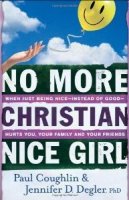 No More Christian Nice Girl, by Paul Coughlin and Jennifer D. Degler (Bethany House, 2010)
No More Christian Nice Girl, by Paul Coughlin and Jennifer D. Degler (Bethany House, 2010)
No More Christian Nice Girl? Yuck.
Don’t judge a book by its cover—or title—I told myself; there must have been a reason why I accepted this book from the publisher for review.
Flip to a random chapter. Yeech. If the title made me gag, this chapter nearly made me lose my dinner. Well, accepting the book is a promise to review it, which implies I must read it.
I didn’t care much for the beginning, either, but fortunately, it got better. I don’t like the authors’ style, so it helped to separate that from the content. They do have some good points to make. (More)
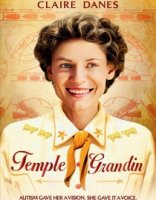 Temple Grandin (HBO, NR)
Temple Grandin (HBO, NR)
Why are you reading this post when you could be rushing to your nearest video store (is that phrase as passé as "dialing a phone number"?) and grabbing a copy of Temple Grandin? It would be trite to say that this is one of the most amazing and inspiring movies I have ever seen, though it is. It would be understatement to say that Temple Grandin is an incredibly amazing and inspiring person.
"Highly functioning autistic" doesn't begin to describe this brilliant visual thinker—and university professor—whose humane designs have revolutionized livestock handling. My introduction to Temple Grandin was through her TED lecture, The World Needs All Kinds of Minds. That's a good place to start, but don't miss the movie. (As far as I can recall it is completely grandchild safe.) (More)
Stella Sung: The Phoenix Rising
Chausson: Poème
Tchaikovsky: Romeo & Juliet
Vaughan Williams: The Lark Ascending
Stravinsky: The Firebird
This concert was pure pleasure. Five gorgeous works, two new and three old favorites. Plus I found a new and much easier way home. 


